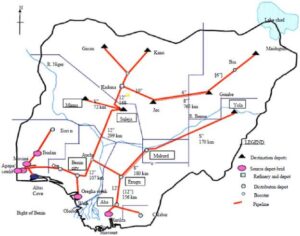 The Nigerian National Petroleum Corporation (NNPC) announced yesterday, Monday, June 29, that the Ajaokuta-Kaduna-Kano (AKK) gas pipeline project is scheduled to be completed in 24 months.
The Nigerian National Petroleum Corporation (NNPC) announced yesterday, Monday, June 29, that the Ajaokuta-Kaduna-Kano (AKK) gas pipeline project is scheduled to be completed in 24 months.
The 40-inch 614 kilometres pipeline is expected to transport about 2.2 billion cubic feet of gas per day.
NNPC had announced that due to the measures being put in place to help contain the spread of COVID-19, the inauguration of the project would be done virtually by the President of the country from Aso Rock Villa in Abuja today, 30th June, 2020.
In a release by Dr Kennie Obateru, the Group General Manager, Group Public Affairs Division of the Corporation, it is stated that the project will not only transport 2.2 billion cubic feet of gas to the domestic market, but also add 3,600 megawatts of power to the national grid and revitalise the country’s textile industries, which will create about three million jobs in different parts of the country.
The project, when completed, will originate from Ajaokuta in Kogi state, pass through the Federal Capital Territory Abuja, Niger state, Kaduna state, and terminate at Kano state. It will help to boost the domestic utilisation of natural gas.
The pipeline will be fed from the existing infrastructure in the country, with a capacity of over 1.5 billion cubic feet per day and it will run parallel to the existing Nigerian Pipelines and Storage Company’s 16-inch crude oil and 12-inch pipelines wherever possible.
The AKK project will support the local development of petrochemicals, fertiliser, methanol and other gas industries.
The project is an integral part of the Nigerian Gas Master Plan (NGMC), which was approved by the country’s Federal Executive Council (FEC) in 2008.
The NNPC GMD, Mele Kyari, has worked hard to remove all obstacles preventing the commencement of the project, whose Engineering Procurement and Construction (EPC) contract was awarded by the FEC in 2017. His efforts have paid off and led to the scheduled inauguration for tomorrow.
The release adds that the project is being expanded by Escravos-Lagos Pipeline System II (ELPS II) and Obiafu-Obikrom-Oben (OB3) gas pipeline, which is under construction and will double the capacity to over 3 billion cubic gas per day.
The pipeline is to complement other domestic gas transmission systems in the country which include the 36-inch Escravos-Lagos Pipeline I and II with a capacity of 2.2 billion cubic feet per day, and the ongoing OB3 pipeline with a projected capacity of 2.4 billion cubic feet per day.

